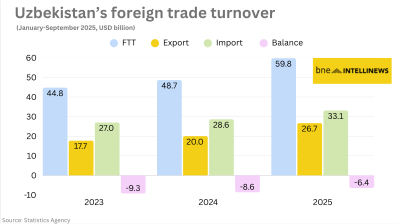After a strong recovery from the coronacrisis in 2021, when regional growth hit 7.4%, GDP growth across the six Western Balkan countries is set to slow to just 3.1% this year, the World Bank forecasts.
In its latest Western Balkans Regular Economic Report published on May 4, the World Bank pointed to the new challenges the region is now facing following Russia’s invasion of Ukraine.
“[T]he post-pandemic recovery has been cut short, as the war in Ukraine sends shockwaves across the region,” the report says.
Actual growth this year could come in lower than that, as the development bank lists a “daunting” array of downside risks to the economic outlook.
"An expanded conflict or prolonged war in Ukraine could trigger further disruptions to global trade and to energy and food prices. Refinancing risks could arise if external financial market conditions continue to tighten. Debt sustainability may become a concern if limited fiscal space is eroded by policy responses to higher energy and food prices amidst rising refinancing costs,” according to the report.
“Despite a strong rebound from the pandemic, the Western Balkans now face a new set of challenges, compounded by the war in Ukraine, including rising energy and food prices, high inflation and slowing trade and investment,” said Linda Van Gelder, World Bank country director for the Western Balkans, quoted in a press release from the bank.
Performance in 2022 is expected to vary considerably across the region from 3.9% in Kosovo to 2.7% in Bosnia & Herzegovina and North Macedonia. The bank projects Montenegro's growth at 3.6% and both Albania and Serbia at 3.2%.
The region as a whole will perform slightly better than the EU27, where growth of 2.9% is projected, but less well than the Central European EU members (Bulgaria, Croatia, the Czech Republic, Hungary, Poland and Romania) at 4.6%.
Given the fallout from the war in Ukraine, the report recommends that governments focus on building resilience and on undertaking structural reforms to support growth and steer the region’s economies through the crises.
“Careful policy support will be needed to navigate the Western Balkans through these crises and protect the important gains made in 2021, including poverty reduction,” said Van Gelder.
“With limited fiscal space, countries will need to carefully weigh the costs and benefits of new spending commitments in response to higher energy and food prices, prioritising the most vulnerable households,” added Sanja Madzarevic-Sujster, World Bank senior economist and one of the report’s lead authors.
Data

Turkey's central bank remains cautious, delivers 100bp rate cut
Decision comes on eve of next hearing in trial that could dislodge leadership of opposition CHP party.

Polish retail sales return to solid growth in September
Polish retail sales grew 6.4% year on year in constant prices in September, picking up from a 3.1% y/y rise in August, the statistics office GUS said.

Uzbekistan’s nine-month foreign trade nears $60bn
Export growth of 33% and import expansion of 16% y/y produce $6.4bn deficit.

Hungary’s central bank leaves rates unchanged
National Bank of Hungary expects inflation to fall back into the tolerance band by early 2026, with the 3% target sustainably achievable in early 2027 under the current strict policy settings.




